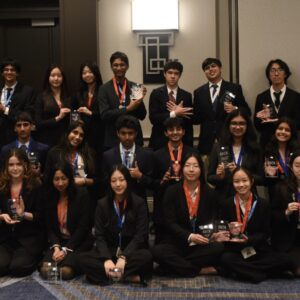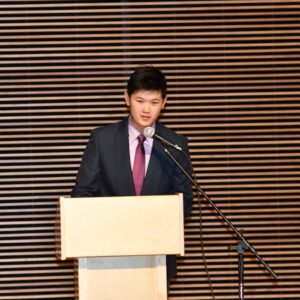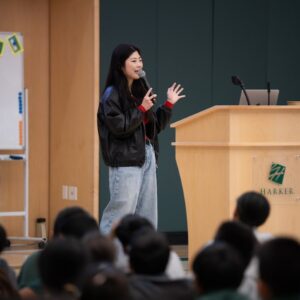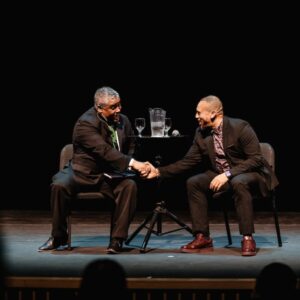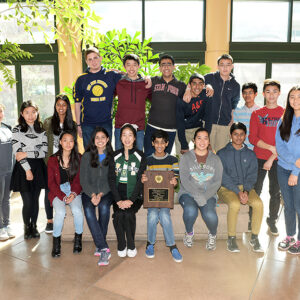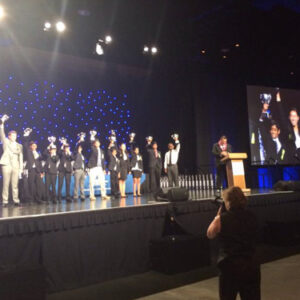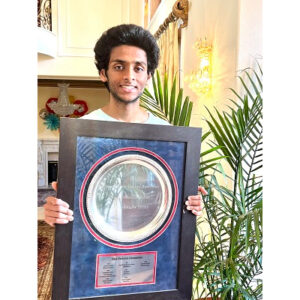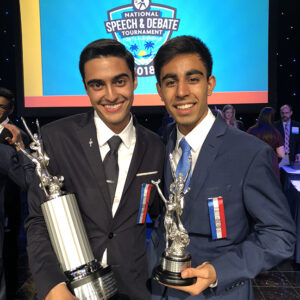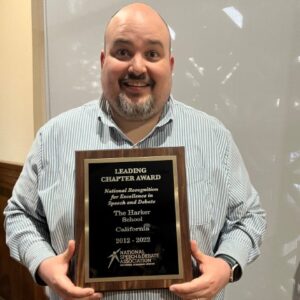This article originally appeared in the spring 2015 Harker Quarterly.
For nearly a decade, Harker’s speech and debate program has given students the invaluable skills they need to present and persuade. In the past five years, Harker students have won multiple national championships in nearly every speech and debate event they have entered. The department’s profile has continued to grow as more people realize the critical importance of clear, persuasive communication.
Before department chair Carol Green joined Harker in 2006, the speech and debate program consisted of only a few dozen students at the upper school. “Now I myself teach about 70,” Green said. She attributes the heavy growth over the past several years in part to the program’s expansion into more types of events.
“When I first got here, the only two events we did were policy debate – which is a very technical two-person debate – and Lincoln-Douglas debate, which is a very technical one-person debate,” Green recalled.
These events have students debating a single topic year-round, requiring intensive research. They are judged by experts in the chosen topic who are keenly aware of how nuances of speech can affect how a message is received.
The judges’ expertise in the chosen topics means students must demonstrate considerable knowledge of the subject area when arguing their sides.
In her second year at Harker, Green added public forum debate to the program. In contrast to the more research-heavy debate events, public forum changes topics every month, and is evaluated by citizen judges.
“Citizen judges are anyone off the street – lawyers, doctors, moms, dads. People you’re going to have to persuade in everyday life,” Green explained. “So you’re looking at a different type of persuasion, because they don’t know necessarily the most technical jargon, but you’re still looking at the human elements of persuasion.”
In addition to public forum, the department added individual speech events and congressional debate, which fit better with the schedules of most Harker students. “So if a child takes a month off to go do robotics, they don’t lose out on a competitive edge because they just skip,” Green said. “And so when we introduced these other activities that still taught oral communication skills, taught research skills, but maybe weren’t as intense, we had a greater retention level.”
Once more students began entering these events, “the students became successful and success breeds success,” Green explained. The program’s growing profile and the reputation it developed for building strong communication and presentation skills attracted more students to the program.
Senior Nikhil Kishore, who in the fall semester earned a trip to the National Speech & Debate Association’s Tournament of Champions, found that he enjoyed debate because it gave him more control over how far he progressed in comparison to other competitive events, such as sports.
“It’s a lot more student driven,” he said. “If you actually do more work yourself, that’s a lot. It really dictates how well you do, how much research you’ve done, how much prep you’ve done.”
He has also found the environment highly collaborative, which has been key to his success. “It’s really good because you can bounce ideas off of [peers] and you’re working with some of the smartest people, which helps you create all these good ideas and things that you can work with in a debate.”
“If you get eliminated [from a tournament], you immediately turn around and become a member of the coaching staff and continue to help until Harker is eliminated as a whole,” Green said. “Because even though you’re an individual competitor, you’re still part of a team.”
In summer 2010, Harker’s middle school debate squad traveled to the National Junior Forensic League’s national championship, where it took both first and second place in public forum. The addition of Karina Momary to the faculty later that year bolstered the middle school debate program. Momary quickly sought to expand the middle school program by adding more events.
Having come from a larger debate program in her previous job, Momary wanted to enhance the middle school program by offering more than public forum, which focuses on current events. “Not everyone likes talking about current events. Some people want to talk about moral values and some people want to talk about policy issues,” she said.
Since then, the middle school program has won at the national level in every debate event it has entered. “A lot of parents ask me which style of debate are we better at, and we are just as good at all of them,” Momary said. “Part of the reason is we encourage students to find their passion and to research something that interests them, and with that comes the passion to excel.”
When she joined Harker, there was a scarcity of local middle school debate competitions, which made preparation for national tournaments a challenge. Momary took the bold step to start entering her students into high school-level tournaments, which drew criticism from some in the debate community. “And then our kids started beating the high school kids,” Momary said. “And now all the middle school programs out here do the same thing.”
Green attributes much of Harker debate’s success to the resources available to students. “Honestly, I think the Harker community’s a large part,” she said. In a recent example, upper school debate teacher Greg Achten’s students were to debate on environmental issues, which prompted Achten to invite science teacher Kate Schafer to speak with his students on the topic. “Being able to draw from the rest of the Harker resources and the Harker community really allows our students to take it outside of the text,” Green said.
Green added that students also learn how to argue from both sides of the debate, “forcing students to question their own beliefs, to understand and build stronger foundations in their beliefs, because they know what the opposition’s going to say and they know how build a response to that.”
Middle school students also get help from upper school debaters, who offer support and guidance at after-school practice sessions and workshops. Momary noted that middle school team captains are in near-constant contact with upper school captains to coordinate and prepare arguments. When middle and upper school students travel to tournaments together, they are set up as buddies. “Everyone supports each other and really works as a team,” she said.
“Harker debate is really like a huge family,” said Cindy Wang, grade 8. “The shared love of debate connects all of us and we help each other in difficult or stressful situations. Being on the team is an amazing experience; the support I have received from the parents, coaches and peers has really helped me work hard toward improving.”
A large part of debate’s popularity with Harker students can be attributed to the skills its students develop, which can be applied to many disciplines, including academics or future careers. “They’re learning how to construct an argument, which is really helpful when they’re doing things like writing persuasive essays or writing research papers and things like that, for social sciences and for STEM,” said Green.
“There’s nothing that would prepare them for the boardroom better than being able to stand up and deliver their ideas,” said Momary. “A few of the parents have come back and told me they watched their students talk to VCs in a boardroom and couldn’t believe that they had the
ability to do that.”
Debate also gives students the opportunity to perform extensive research on a wide variety of topics. While researching a debate topic, students may immerse themselves in global economics, environmental sciences, current events or even the nature of debate tournaments themselves.
“We focus a lot on current events. So it encourages you to keep up with the world and see what’s going on, which is pretty interesting because often you learn a lot of things that you wouldn’t have otherwise known,” Kishore said.
As students frequently travel to tournaments, time management also becomes an important tool of the trade, which Wang found especially important. “I’ve learned to do my homework faster and more efficiently so I can leave time for debate, and I can apply this skill everywhere to do as much as possible in a given timeframe.”

